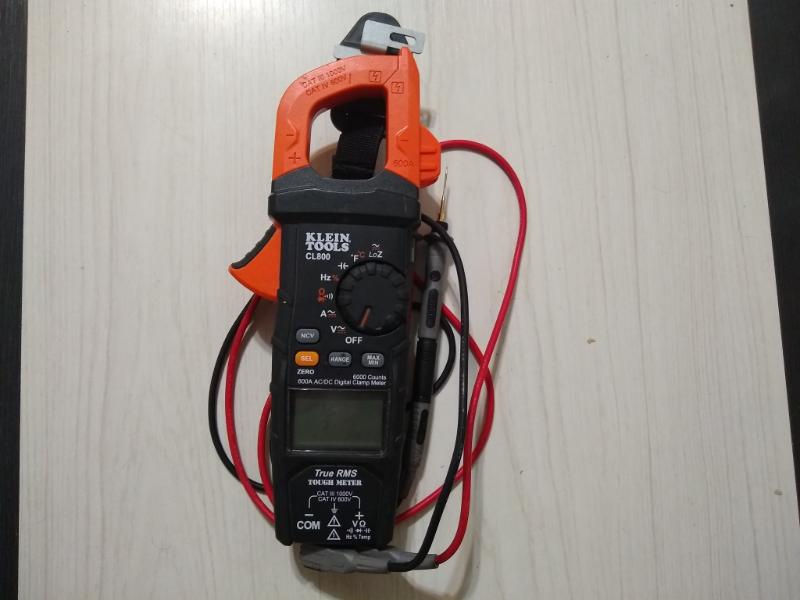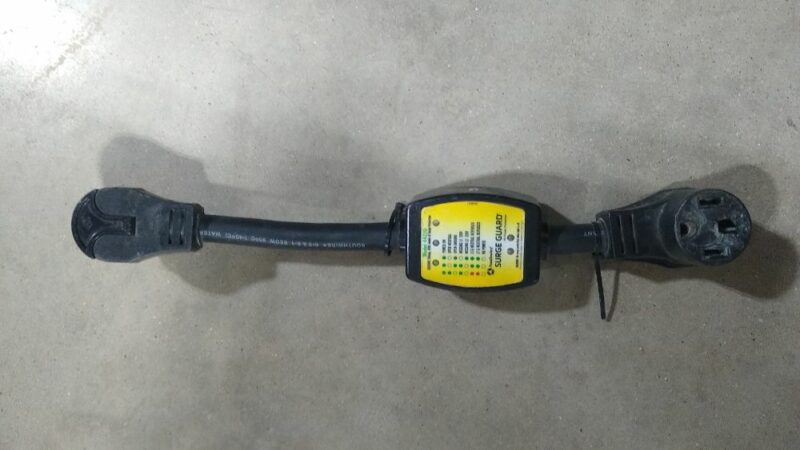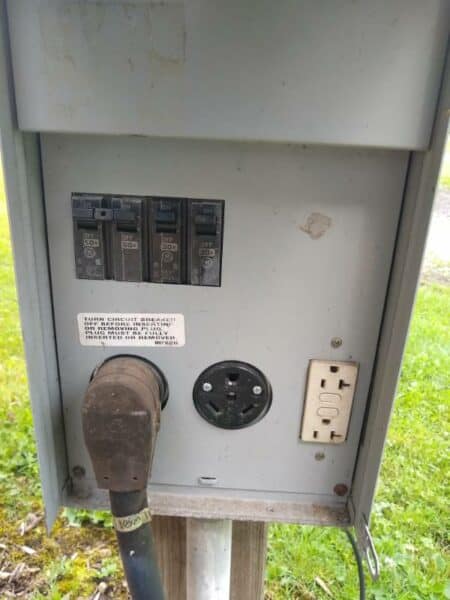In the matter of protecting your RV when hooking up to shore power, you have three options:
- Check the power manually with a multimeter
- Monitor the power automatically using an advanced surge protector
- Believe that all people and wiring are basically good at heart.
Which Is Better for RV Power Protection: A Multimeter or a Surge Protector?

Between the first two options, you might assume, given that I am a recovering penny-pincher AND a bit of a data freak, that I would award the blue ribbon to the multimeter. For a $50 outlay, you can measure just about any electrical quantity you might want to learn about: voltage, resistance, current, capacitance, frequency, etc. Plus, you’ll get specific numbers. A surge protector, on the other hand, hides most of its thinking, and it only communicates with blinking LEDs and error codes.
But truthfully, first place on the podium goes to an advanced surge protector. Every time. It’s for a simple reason: A multimeter informs; a surge protector protects. A surge protector can make its own decisions to kill power; a multimeter is read-only. A surge protector monitors your power hookup continuously, whereas a multimeter can only sense data in real time.
Yes, you should own a multimeter and know the basics of how to use it, especially to measure AC and DC voltages. But when you plug into shore power, I would reach for my surge protector first. Multimeters are better used for diagnostics, not daily use.
What Is an Advanced RV Surge Protector?
– I interrupt our regularly scheduled programming to define the term “advanced surge protector.” Hopefully, you’ve read my introduction to RV surge protection already, and if you haven’t, grab another coffee and go read it.

An “advanced surge protector” is also known as a “smart surge protector” or just an EMS, which stands for Energy Management System. The apellation “EMS” was coined by Progressive Industries and is technically reserved for their brand of advanced RV surge protectors, but the term has become eponymous for similar products from Hughes, Southwire, and their competitors.
Surge protectors are available in both portable and hardwired versions, each with their pros and cons.
What Does a Smart RV Surge Protector Protect From?
If you’re confused about why you need an advanced surge protector in the first place, it’s because not all electrical power is created equal.
Think of electricity like drinking water. You want clean, pure, spring water; your RV wants clean, pure electricity at 120-volts AC line voltage with minimal harmonics and distortion. Would you drink from a scum-covered, slimy pond? No? Well, your RV doesn’t enjoy trying to run off “dirty” electricity, either. Some of these electrical problems include:
- Under/Over Voltage
- Reversed Polarity
- Open Ground
- Open Neutral
Under/Over Voltage
In the US, nominal residential line-to-neutral voltage is 120 volts. When the voltage exceeds ~136 volts or dips below ~102 volts for more than a few seconds, the surge protector will cut power. This protects your RV from fried circuit boards and damaged motors and compressors.
Surge Protection
All RV surge protectors have a sacrificial element that protects your RV from voltage surges and spikes from lightning strikes or power grid failures. Better to pay $200 for a new surge protector than $10,000 for all new appliances!
Reversed Polarity
If the “hot” and “neutral” conductors are reversed at the power pedestal, then A) this reverse polarity will damage many sensitive electronics and B) appliances that still work will have a “hot” neutral, even if the breaker is tripped or the control switch is flipped. That’s a fire/shock hazard and a big no-no.
Open Ground
An open ground condition indicates a break in the Equipment Grounding Conductor (EGC) path between the power outlet and the main service panel. Without a functioning ground, fault currents and leakage currents can create a “hot skin” condition on your RV, which is a potentially dangerous shock hazard.
Open Neutral
Particularly if you own a 50-amp RV, an open neutral can cause some pretty wonky electrical problems. You’re likely to severely damage some of your AC appliances, like your air conditioner or microwave.
Miscellaneous
Some advanced RV surge protectors will also provide over-current protection, hi/low frequency detection, accidental 240-volt protection, time delays, and other detection and protection features.
These are all very important features, but the first five I listed are the most commonly called upon, I would guess.
Remember: A Multimeter Can’t Continuously Monitor the Power!

I preach the virtues of advanced surge protectors because they work tirelessly, sleeplessly, 24/7. They monitor for changing conditions; you can’t do that if trust your own multimeter. Save the multimeter for diagnostics and double-checks.
For instance, let’s say you pull into a campsite with a 50-amp RV. You whip out your trusty voltmeter and check the power pedestal:
- L1-G: 122V
- L2-G: 116V
- N-G: 2V
- L1-N: 122V
- L2-N: 117V
- L1-L2: 239V
These are reasonable numbers. You’re satisfied, so you go inside and forget all about the electrical hookup.
Well … what you didn’t know was that the neutral wire in the power pedestal actually has a loose connection. Once under load, that connection expands from heat, and sometimes it breaks open. That causes an intermittent open neutral condition, which can quickly fry sensitive electronics. But you don’t realize anything until you smell the magic smoke and realize something is very, very wrong!
Conclusion: Buy Once, Cry Once
Buying an RV surge protector isn’t very fun, I know. They’re kind of expensive, not very sexy, and they don’t help you catch more fish. But I recommend every serious RVer own one. They’re cheap insurance; better to have it and not need it, than need it and not have it!
Leave a Reply